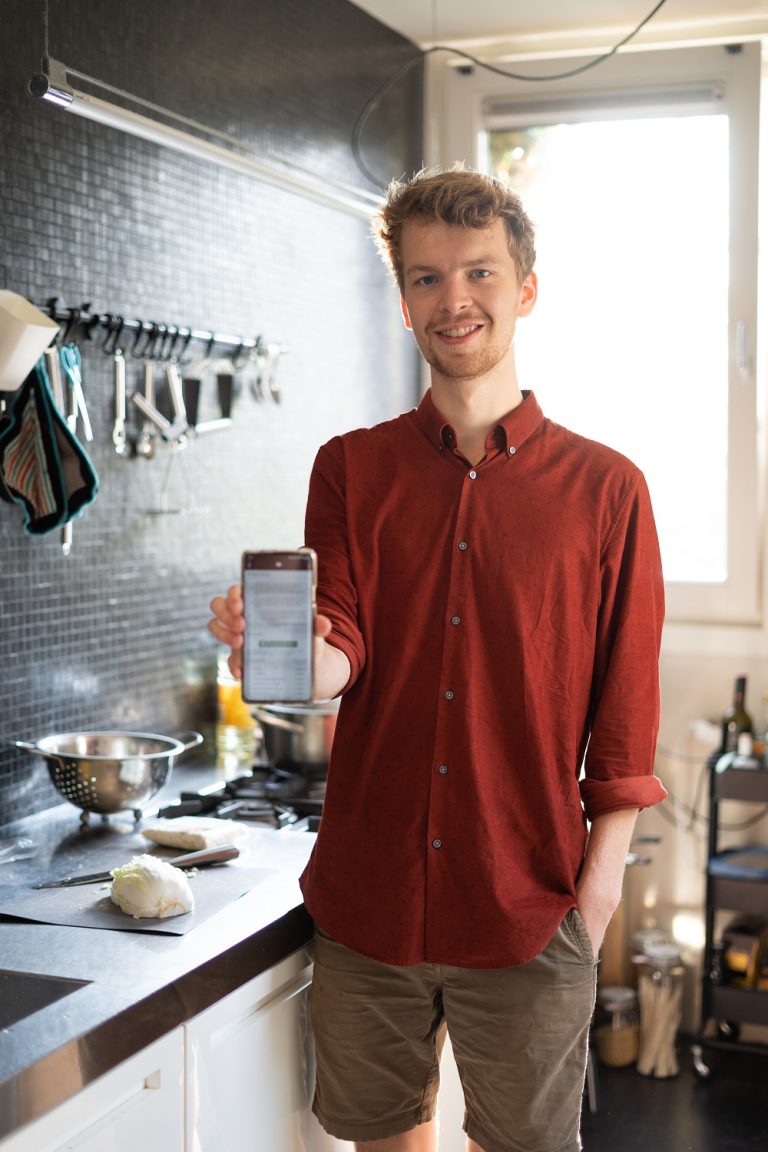Master’s student Jurrian de Boer came up with the idea of Carbonera. You can use this app to calculate the climate impact of your recipes and make your diet more sustainable.
Jurrian de Boer prepares his favourite climate friendly dish: soup noodles with tempeh (Photos: Daniël Korvemaker)
Anyone wanting to reduce their CO2 footprint should look at what they eat. The food industry worldwide accounts for more than one quarter of the total CO2 emissions. By being more aware of what we eat and drink, we can help the climate. But how do you know if it’s better to fill your sandwich with chicken breast or cheese?
Master’s student of Artificial Intelligence Technology Jurrian de Boer (Electrical Engineering, Mathematics and Computer Science) thought up Carbonera, an app which helps you calculate the climate impact of your recipes.
Easy to use
Carbonera – a combination of the Italian pasta dish and the word ‘carbon’ – acts as a recipe manager. “You input recipes by hand or import them from the web,” explains De Boer. “The app reads the ingredients and then calculates the climate impact in CO2 equivalents.”
The idea for Carbonera came up during a reception after a climate meeting in Groningen, where De Boer was studying at the time. “A friend and I talked about what we students could do to contribute. One-and-a-half years of hard work later, Carbonera was there.”
At present about 50 to 70 people are using the app. They are mostly people that De Boer knows personally, friends who have been working on reducing their CO2 footprint for a while. As the app is designed as a recipe manager, he hopes that Carbonera will attract a wider audience in the future. “It is a simple application that not only saves recipes, but one press of the button will also generate shopping lists.”
To calculate the climate impact, De Boer uses life-cycle analysis (LCA) databases. These analyse the impact of a product, process or service in the world. “The figures that you see in the app are the average of the data available in Western countries.”


He notes that it is not easy to compare all LCA databases with each other. “The same product is analysed by several research groups and this generates different results.” De Boer thinks that this is mostly related to scale – what do you include and exclude in the analysis? “Do you start calculating from the seed through to the distribution centre in the destination? Or do you also include the cooking and waste processing of the packaging?”
Meat replacers
What does the analysis mean for the app user? “Depending on the CO2 emissions of each recipe, the app suggests a more sustainable option. Take a recipe for beef burgers for four people. The emissions are about 11 kilograms of CO2. The app suggests a more environmentally friendly option of the same recipe using vegetarian hamburgers. The emissions are then about 2.5 kilograms CO2.”
That meat replacers reduce your CO2 footprint is well known. Other findings are more surprising. Anyone doubting between a sandwich with chicken breast or cow’s cheese, chooses the meat as the more sustainable option, says De Boer. “Though a classic Dutch sandwich with 100% peanut butter is an even better option.”
His favourite climate friendly dish is soup noodles with tempeh. “The soup is on the table within half an hour and at 0.5 kilos per person, is low in CO2 emissions.”
Open source
The future of Carbonera is in the air. “I wonder whether people really want to regularly think about the climate impact of their diet. But for now, I hope that more people will use the app and that Carbonera will continue, even after I am no longer involved. I might make the software open source so that more people can contribute.”
Do you have a question or comment about this article?
m.vanderveldt@tudelft.nl


Comments are closed.